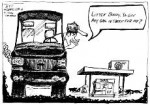Accountability lacking in Rumsfeld’s actions

With more than 2,000 American soldiers killed, many more wounded and at an economic cost estimated by Nobel Prize-winning economist Joseph Stiglitz to be between $1 trillion and $2 trillion, there is much to debate about the Iraq war.
Add to the debate the recent chorus of retired generals calling for Secretary of Defense Donald Rumsfeld to resign. For proponents of the war effort, it is difficult to discredit these individuals as just more of those “left-wing loonies.” These are career military men who distinguished themselves over lengthy careers and on several battlefields. Listening to what they have to say, there are some big problems in the front office at the Pentagon.
Retired Maj. Gen. Paul D. Eaton, who commanded the training of Iraqi forces, has said Rumsfeld is “incompetent strategically, operationally and tactically.” Anthony Zinni, a retired Marine general who was once in charge of Central Command at MacDill Air Force Base, said, “The problem is that we’ve wasted three years.” He also said Rumsfeld should “absolutely” resign.
The litany of scathing quotes from generals with experience on the ground in Iraq and Afghanistan as well as senior members of the Pentagon staff could go on and on. But the question remains: Why is there such a concerted effort to get rid of the secretary of defense now? After all, there isn’t a breaking story making these allegations particularly timely.
Perhaps this storm has been forming for quite some time. While the half-dozen or so retired generals who are vocal are now getting time on Sunday talk shows and in magazines to vent their frustration, they haven’t been the only soldiers to question the war plan.
Don’t forget former Army Chief of Staff Gen. Eric Shinseki, who testified before Congress in 2003 that several hundred thousand troops would be needed to occupy Iraq. According to Newsweek, Rumsfeld and his deputy at the time, Paul Wolfowitz, reacted to Shinseki by “publicly castigating and shunning him.” Rumsfeld doesn’t seem to react well to being questioned.
All the attention these generals are getting must be pretty uncomfortable for Rumsfeld. After all, if it were just one lone general, the public could always write that general off by saying he or she had been skipped for promotion and was bitter. But what are the odds that all these generals fall into this category? That just doesn’t seem plausible.
What does seem realistic, however, is that Rumsfeld wanted this war all along, but now doesn’t know how to get the “mission accomplished.” He indicated to his aides just hours after a plane slammed into the Pentagon that plans should be made to strike Iraq. In his own words: “Go massive. Sweep it all up. Things related and not.”
But things haven’t gone well in Iraq. Post-war events have seen America greeted not as liberators, but with improvised explosive devices. Ethnic tensions have escalated to near-daily killings with little indication – despite elections – that a government is close to being formed. All this has occurred with Secretary Of Defense Rumsfeld in the middle. It is time for a change.
Rumsfeld, who displays an archaic persona in Washington, D.C., is in his second stint as secretary of defense, the first stint occurring from 1975-1977. At 73 years old, his authoritarian style might have been well suited for the Department of Defense 30 years ago, but what the United States needs now is some fresh leadership. Crucial to the working balance between civilian and military leaders in the military is trust that the best decisions are being made. Americans have lost that trust.
I’m not suggesting that replacing the defense secretary will solve every problem in Iraq. This is a crisis that goes beyond just one individual sitting behind a desk. But accountability for actions and results is a necessity for credible government. Evidently, this isn’t required in President George W. Bush’s Cabinet. As this second-term president has shown, loyalty trumps competence.
Aaron Hill is a senior majoring in economics.





